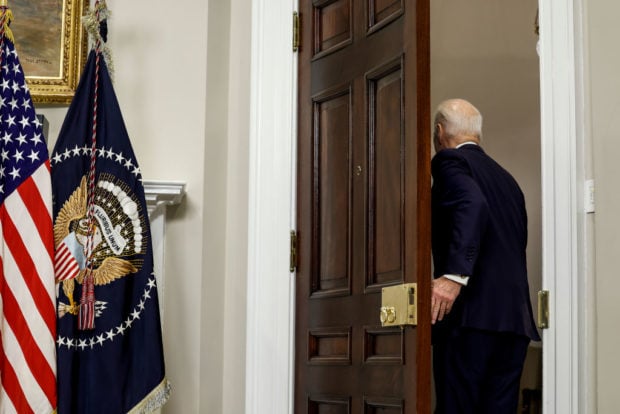The 13th Amendment bans involuntary servitude, and yet every single American citizen is involuntarily enslaved to the federal government. Don’t think so? Try not paying your taxes this year and see what happens.
President Joe Biden proposed a budget on Thursday that includes tax hikes on the wealthy and Medicare expansions as he seeks to cut the deficit by nearly $3 trillion.
Among the provisions are a 25% minimum tax on billionaires, quadrupling the tax on corporate stock buybacks, reforming the capital gains tax for those making more than $1 million and repealing former President Donald Trump‘s tax cuts.

WASHINGTON, DC – MARCH 13: U.S. President Joe Biden departs after speaking about the banking system in the Roosevelt Room of the White House on March 13, 2023 in Washington, DC. (Photo by Anna Moneymaker/Getty Images)
Of course Congress needs money after decades of ballooning the deficit with wasteful and reckless spending, providing the general welfare rather than promoting the general welfare. (RELATED: JONATHAN WILLIAMS And NICK STARK: Why A Wealth Tax Is A Really Bad Idea)
But we would not be in this position today if Congress executed its constitutional duties rather than forcing Americans to shoulder the burdens of its reckless ways.
It is time to abolish the 16th Amendment and let Congress learn how to live within its means.
Congress has the power to levy taxes for three very distinct purposes: “to pay the debts and provide for the common defense and general welfare of the United States.” The Founders purposely included restrictions on federal taxation to protect the People from the government. The 16th Amendment chiseled away what little protections were left by the early 20th century.
President Abraham Lincoln signed a bill into law in 1862 allowing Congress to levy an income tax. The law was repealed nearly a decade later for being unconstitutional.
Congress decided to try its hand at another income tax law in 1894, but the Supreme Court ruled the following year in Pollock v. Farmers’ Loan & Trust Co., that it was an unconstitutional “direct tax” because it was not levied in proportion to the state’s population. This was one of the first major instances of attempted federal overreach that was stopped by the courts. A major takeaway was that taxes on income of personal property were direct taxes and therefore unconstitutional.
The term “direct tax” comes from Article I Section IX.4, which says, “… no capitation, or other direct, tax shall be laid, unless in proportion to the census or enumeration herein before directed to be taken.” A “direct tax” is a tax levied on a person rather than a good.
The Founders purposely gave Congress the power to levy indirect taxes was because these taxes were generally consumption taxes (e.g. liquor). Thus, if taxes became too high, consumers could refuse to purchase said goods, forcing the government to make concessions based on what the People wanted.
The Founders left the power of direct taxation up to the states, curbing the federal government’s ability to capriciously impose taxes. It was believed that import duties and luxury taxes were sufficient to allow the federal government to carry out its responsibilities. In cases of war, Congress could levy a direct tax only after sharing the amount needed, its purpose, and dividing the bill among the states based on population.
Direct taxes were to be apportioned among the states according to population.
By 1913, those greedy bastards knew that levying a direct tax through an income tax was unconstitutional, leaving them one option: change the Constitution itself.
The 16th Amendment, which reads, “the Congress shall have power to lay and collect taxes on incomes, from whatever source derived, without apportionment among the several states, and without regard to any census or enumeration,” nullified the decision in Pollock v. Farmers’ Loan & Trust Co., because it ended the requirement that income taxes be apportioned among the states to the population.
But not all Americans had to worry about the new income tax at first — it was billed to target top earners. Congress levied its first income tax on those making more than $3,000, which at the time was a very small portion of the population. In 1918, the top tax rate hit 77%, which while ridiculous, still didn’t touch most earners. Eventually everyone was taxed. If this sounds familiar, it’s because socialists like Alexandria Ocasio-Cortez and Bernie Sanders keep trying to sell the shtick that their tax increases would only pertain to the top earners — but history tends to repeat itself.
The 16th Amendment is conveniently and intentionally ambiguous, too. The federal government has unrestricted power to lay and collect taxes, widening its discretion to impose taxes according to its needs, without possibility of redress for the American people.
Congress has three fiscal responsibilities. They don’t need all the new responsibilities they set for themselves in an effort to promote political interests. Rather they must fulfill their duties as laid out in the Constitution. Americans shouldn’t have to bear the burden of irresponsible government spending masqueraded as ‘responsibilities’ by Congress.
The United States survived without any income tax from 1776-1912, surely it can survive the 21st century without one.


